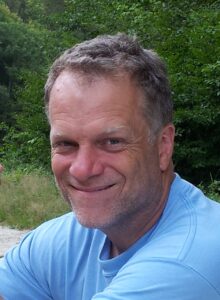Our thanks to Frank for taking the time to share with us these valuable glimpses into process.
Would you please tell us a little about your writing process?
I am fortunate that I have a longstanding community that has helped me find my voice as a writer. Fifteen years ago I was trained by the nonprofit NY Writers Coalition to become an Amherst-method workshop leader and I volunteer with another nonprofit, the Creative Center for Health and Healing, to run a workshop there. My group writes together for two hours every Monday, responding to prompts I pick beforehand, and we give each other positive feedback and encouragement. The workshop members are not technically ‘aspiring writers,’ and come from all walks of life; all share experience with lifetime illness. They are a huge source of support and inspiration. I get to write with them. I’ve filled dozens of notebooks with scribbles. When I have spare time between my work and kids, I’ll type some of these scribbles out and try to boil them down into stories.
How do you believe a writer improves? Practice? Mentors? Reading everything? Attending festivals?
As torturous as it is for some of us–myself included–I believe that reading your work aloud is the best possible way to hear what you are trying to say in a story, and also to understand what might have to come out. In a reading–or even when reading to your spouse or friend–you need to keep your listeners engaged in a live setting. I did an open mike recently in the city, my first live reading in a long time, and it was very energizing, and a little terrifying—but it helped me listen to, and understand the story I was trying to tell. This time the audience was really responsive and laughed alot. But even as a 40-year Brooklyn resident, I will say this-you have to have thick skin. At my previous live reading here, I was met with stone silence. The time before, I was heckled by a drunk at the bar.
What are the most important steps an amateur writer can take?
To understand and avoid the obstacles that you create for yourself—the many things you will do to stop yourself from writing including setting time limits or word limits; editing and re-editing before you’ve moved through the piece; giving up because you can’t find the end to your own story. There are forms of criticism you will hear from others that will be harsh, and that’s not so bad; much harder to interpret is the things people say when they are trying to be helpful—‘your story reminds me of a story by X’ or ‘I would have liked to see more of Y.’ They will make you doubt yourself. Don’t doubt yourself! Don’t force a story to be a ‘good story.’ Listen to your characters. Let them tell the story.
Who would you say are your literary forebears? Who have you learned the most from?
I’ve read a lot of great literature in my life and I still mostly read classics. I could never write a story like Tolstoy but I am definitely inspired by the way he describes a tree on the horizon just before a storm hits, or the way a clerk’s uneven eyebrows reveal what he is thinking. Recently, my story writing is probably more influenced by country music than anything literary. I really like the way John Prine and Kris Kristofferson and Townes Van Zandt construct and tell their stories, and the voices of their characters.
Which books is it most important for an aspiring writer to read?
I would vote for A Moveable Feast by Ernest Hemingway. Whether you love or hate Hemingway, the stories capture how he developed a set of rules for writing and he certainly stuck with it, throughout his career. And he was prolific. Also, it’s a fun read–the book captures the romantic elements of the struggle of a young, starving artist in Paris in the 20s.
Are there any downsides to being a writer?
Living in New York City for most of my life, I am constantly reminded of the business of being a writer. If you don’t have an MFA from one of the top colleges, and if you don’t have an agent, then in many people’s eyes you’re not a ‘serious’ writer. The downside of this culture is that we are constantly reminded, as writers, of what ‘success’ is and isn’t. Everybody in this city, and everybody on this planet has a story to tell. Some of us are very fortunate to have the time and energy and patience to write our stories, and a few of us have the great privilege of sharing our stories—with or without an MFA or an agent. That, to me, is the upside.
Frank Haberle is the author of two books: Downlanders (Flexible Press, November 2023), following five misfits into a fictional wilderness; and Shufflers (Flexible Press, Minneapolis, September 1 2021), a story of transients moving through minimum-wage jobs in the 1980s. Frank’s short stories have won awards from Pen Parentis, Beautiful Loser Magazine, the Sustainable Arts Foundation, and the Rose Warner Prize for Fiction. They have appeared in more than 30 journals including Deep Wild Journal, the Adirondack Review, the Baltimore Review, Wilderness House Literary Journal, Necessary Fiction, Vagabonds and the Nomadic Review. Professionally, Frank has worked thirty years in nonprofit development, most recently with New Settlement in The Bronx. Voluntarily, he leads an Amherst method-driven writing group with the Creative Center for Health and Healing on the Lower East Side. Frank lives in Brooklyn with his wife and three children.

